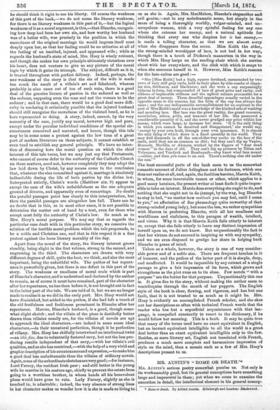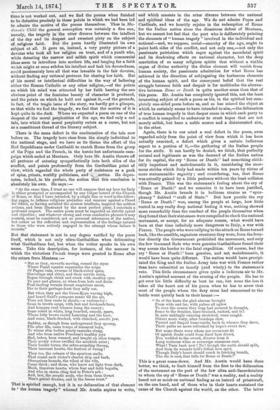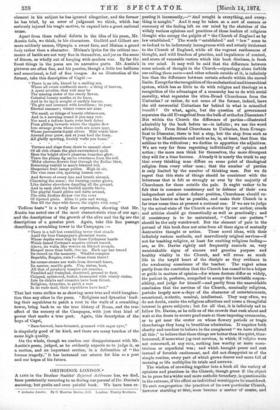MR. AUSTIN'S "ROME OR DEATH."*
MR. AUSTIN'S serious poetry somewhat puzzles us. Not only is its workmanship good, but its general conceptions have something large and impressive in them; yet when we come to examine the execution in detail, the intellectual element in his general concep-
• Rome or Death. By Alfred Austin. Edinburgh and London; Blackwood.
tions is not worked oat, and we find the poems when finished to be defective precisely in those points in which we bad been led to admire the motive of the poems themselves. Thus in Ma- donna's Child the general conception was certainly a fine one, namely, the tragedy in the utter divorce between the intellect of the day and its deepest and sweetest piety on the subject of religious faith. But the poem hardly illustrated its own subject at all. It gave us, instead, a very pretty picture of a devotee who took all her religion on trust, and of a youth who, while detesting the narrow and selfish spirit which commercial ideas seem to introduce into modern life, and longing for a faith wlich might at once subdue his intellect and task his devotedness, could passionately love all that was loveable in the fair devotee, without finding any rational pretence for sharing her faith. But of his moral or intellectual difficulties in the way of believing either the Roman Catholic or any other religion,—of the points on which his mind was attracted by her faith barring the one obvious point of the feminine beauty of character it produced, and the points on which he held out against it,—of the grounds, in fact, of the tragic issue of the story, we hardly get a glimpse, so that while we feel the tragedy, we feel that the motive of it is kept quite in the dark. Where we expected a poem on one of the deepest of the moral perplexities of the age, we find only a sad tale, into which that moral perplexity enters as a cause, but not as a constituent thread of the literary subject.
There is the same defect in the continuation of the tale now before us. The tragedy here rises from the simply individual to the national stage, and we have as its theme the effort of the Red Republicans under Garibaldi to snatch Rome from the grasp of the Pope and the French, in the heroic but unfortunate cam- paign which ended at Mentana. Only here Mr. Austin throws off all pretence of entering sympathetically into both sides of the conflict, and paints professedly from the Garibaldian point of view, which regarded the whole party of resistance as a pack
of spies, priests, worldly politicians, and crites. He depre- cates, indeed, in his preface, the notion that this conclusion is absolutely his own. He says :— " At the same time, I trust no one will suppose that my love for Italy is either prompted or accompanied by any vulgar hatred of the Church of Rome, or that I have intended, by a single line or word in the follow- ing pages, to inflame religious prejudice and rancour against a Creed for which, as having satisfied the mutest intellects, inspired the noblest actions, and been illustrated by the most perfect piety, I entertain a profound respect. The entire poem must be regarded as strictly epical and objective ; and whatever strong and even combative phrases it may contain, must be considered, not as personal utterances of the author, but rather as the reflection and representation of the feelings natural to those who were actively engaged in the attempt whose failure it records."
But that statement is not in any degree verified by the poem itself, which is not only ultra-Garibaldian when delineating what Garibaldians feel, but when the writer speaks in his own name. Take this description, for instance, of the manner in which the victorious French troops were greeted in Rome after the return from Mentana :—
" But as they, onwards moving, roused the styes Where Papal squalor supersedes the reign Of Pagan ruin, swarms of black-robed spies, Shavelings and sbirri, and their servile train, Began through chink and crack with stealthy eyes To peer and glance, as when from hole and drain Foul-feeding vermin thrust suspicious snout, Ere to their garbage-feast they sally out.
But when they saw the Cross-Keys waving high, And heard Gaul's pompous music fill the air, Then out they came in shoals,—a various fry : Some in brown serge, with feet and foreheads bare, And hempen cord whence hung the rosary ; Some robed in white, long bearded, comely. spare. Whose lofty brows roofed Learning and the Law, And some, black-frocked, with clenched, ascetic jaw.
Sudden, as though from underground they sprung, File after file, came troops of tonsured boys, To whose slim bodies gaudy cassocks clung, And who from native Freedom's healthy joys Had, babes, been weaned, and taught an alien tongue. Their pretty voices swelled the monkish noise; Their tender forms, the sabre-sounding throng, Their innocent hearts, the festival of wrong !
They too, the coiners of the spurious smile, That round each victor's chariot skip and bark, Obsequious hounds, the vilest of the vile, Came thick ; and those, who know not light from dark, Meek, timorous hearts, whom fear and faith beguile, And who in storm cling fast to Peter's ark : And, last, the sceptic souls, who from them thrust Man's genial dreams, and in the fasces trust."
That is spirited enough, but it is no delineation of that element in ' the human tragedy" whereof Mr. Austin aspires to write, and which consists in the utter divorce between the national and spiritual ideas of the age. We do not admire Popes and
Cardinals, and we heartily rejoice in the redemption of Rome for the Italian nation since the disastrous defeat of Mentana, but we cannot but feel that the poet who is deliberately painting the elements of "human tragedy" involved in the individual and national—and, we suppose, social—anarchy of the age, ought to
paint both sides of the conflict, and not only one,—not only the passionate patriotism which rages against the sacerdotal spirit and its deadening effects on national character, but the deep
conviction of so many religious spirits that without a visible organ of divine authority the divine element will vanish from
human society, the passionate admiration for what Rome has achieved in the direction of subjugating the barbarous elements of the human spirit, and the consequent belief that the real struggle between faith and despair is for multitudes the alterna-
tive between Rome or Death in quite another sense than that of this poem. Mr. Austin has completely ignored this, not the least
interesting subject of such a poem as his, in the spirited but com- pletely one-aided poem before us, and so has missed the object at which he certainly seems to have intended to aim,—the delineation of true human tragedy in that deeper sense in which each party to a conflict is compelled to endeavour to crush hopes that are not merely selfish, but have a noble source and a disinterested aim, in the other.
Again, there is to our mind a real defect in the poem, even regarded solely from the point of view from which it has been actually executed, a defect which gives a certain ludicrous aspect to a portion of it,—the gathering of the Italian people for the strife. It can hardly be denied, we think, that perfectly natural and legitimate as was the demand of the Italian nation for its capital, the cry 'Rome or Death!' had something child- ishly impatient and melodramatic in it, considering the enor- mous strides which Italy had made within ten years by virtue of mere statesmanlike sagacity ; and considering, too, that Rome was actually gained by a little patience without the least collision with France. This was the statesman's feeling about the cry of 'Rome or Death!' and we conceive it to have been justified, though Mr. Austin brands it in bellicose strains as " syco- phancy " dubbed "craft of State." But how puerile the cry 'Rome or Death!' was, among the people at large, how little rooted in any really deep national feeling it was, nothing showed more remarkably than the conduct of the people themselves when they found that their statesmen were compelled to check the national movement, or accept, for no adequate reason, what would have been at that time infinitely more dangerous to Italy, a war with France. The people who were rallying to the attack on Rome turned back, like the sensible, sagacious creatures they were, from the fron- tier directly the Government prohibited the movement, and only the few thousand Reds who were genuine Garibaldians found their way across the border to the fatal expedition. Of course, had the cry 'Rome or Death 1' been genuine, and not melodramatic, it would have been quite different. The nation would have precipi- tated the King and the Italian Army into war with France rather than have submitted so tamely (and wisely) to the statesman's veto. This little circumstance gives quite a ludicrous air to Mr.
Austin's spirited account of the arming of the people. He has to get over his little difficulty as best he can, but none the less it takes all the heart out of his poem when he has to avow that most of the people whom the fiery cross had summoned to the battle went quietly back to their homes :-
" So of the hosts the glad alarum brought
From wide and far, with pulses all aglow To rove the course they long had scoured in thought, Some to the frontier, bare-brained, rushed, and lo !
In nets unkingly cunning stretched, were caught.
Others more wary, after footsteps slow, Turned and limped homewards, back to whence they drew, Their paths no more refreshed by hope's sweet dew.
But some there wore whom nor recurrent fit Of aguish doubt could from fixed beat divert, Nor, wedded to the sword, divorce from it Long tortuous wiles or sovereign summons curt. What 1 Turn back now ! No! though the earth should split,.
And from its wounds bell's lethal lava spirt, Though Italy's heart should crack in fetching breath, The die is cast, that falls for Rome or Death!"
This is a great come-down. And Mr. Austin would have done better, we think, to limit himself from the first to the delineation
of the movement on the part of the few ultra anti-Sacerdotalists to whom the cry of' Rome or Death!' was a reality, and a reality based not so much on national feeling as on hatred of priestcraft, on the one hand, and of those who in their hearts sustained the cause of the Church against the world, on the other. The latter element in his subject he has ignored altogether, and the former he has tried, by an error of judgment we think, which has seriously injured his tragic motive, to expand into a great national cause.
Apart from these radical defects in the idea of his poem, Mr. Austin fails, we think, in his characters. Godfrid and Gilbert are
mere soldierly names, Olympia a sweet face, and Miriam a grand body rather than a character. Miriam's lyrics for the critical mo- ments of battle are not very fine in themselves, and jar on the sense of fitness, as wholly out of keeping with modern war. By far the finest things in the poem are its narrative parts. Mr. Austin's pictures are often fine, and his passion, though a little too bellicose and sensational, is full of fine images. As an illustration of the
former, take this description of Capri :—
"There is an isle, kissed by a smiling sea,
Where all sweet confluents meet : a thing of heaven, A spent aerate, that well may be The missing sister of the starry Seven.
Celestial beauty nestles at its knee, And in its lap is nought of earthly leaven.
'Tis girt and crowned with loveliness ; its year, Eternal summer ; winter comes not near.
'Tis small, as things of beauty ofttimes are, And in a morning round it you may row, Nor need a tedious haste your bark debar From gliding inwards where the ripples flow
Into strange grots whose roofs are azure spar'
Whose pavements liquid silver. Mild winds blow Around your prow, and, at your keel the foam, All gladly sporting, freshly wafts you home."
...... • • • Terrace and slope from shore to summit show Of all rich climes the glad-surrendered spoil.
Here the bright olive's phantom branches glow, There the plump fig sucks sweetness from the soil.
'Midst odorous flowers that through the Zodiac blow, Returning tenfold to man's leisured toil, Hesperia s null hangs golden. High in air, The vino runs riot, spurning human care.
And flowers of every hue and breath abound, Charming the sense ; the burning cactus glows, Like daisies elsewhere dappling all the ground, And in each cleft the berried myrtle blows.
The playful lizard glides and darts around, The elfin fireflies flicker o'er the rows Of ripened grain. Alien to pain and wrong, Men fill the days with dance, the nights with song."
Tedious haste" is a truly fine expression, showing that Mr. Austin has noted one of the most characteristic vices of our age ; and the descriptions of the growth of the olive and the fig are the descriptions of a genuine poet. Again, take this fine passage describing a crumbling tower in the Campagna :—
" There is a tall but crumbling tower that stands
Amid the lone Campagna's gloomiest waste, Whose depths were dug by those Cyclopean hands Which famed Cortona's massive circuit traced.
Above, its walls, like wrecks on littered strands, Heaped more than built, rise up. Each age has traced Its record on the masonry. Wouldst compare Republic, Empire, ruin ?—Scan them there !
Its corner-stones are waifs from drowned lanes, Its mortar, marble gods. Urn, statue, bust, All that of porphyry temples yet remains, Tumbled and trampled, shattered, ground to dust, Chipped, splintered, fouled, besmeared with wintry stains, Into its chinks and crannies have been thrust.
Religions dynasties, to patch a rent In its rude mail, their sepulchres have lent."
That last verse strikes us as showing more true and vivid imagina-
tion than any other in the poem. Religions and dynasties' lend- ing their sepulchres to patch a rent in the walls of a crumbling tower, bring back to us the true history of Rome, and the true effect of the scenery of the Campagna, with just that kind of power that marks a true poet. Again, this description of the boys of Capri, "Bare-brewed, bare-breasted, gemmed with eager eyes,"
is singularly good of its kind, and there are many touches of the -same high quality.
On the whole, though we confess our disappointment with Mr. Austin's poem, judged, as he evidently expects us to judge it, as a section, and an important section, in a delineation of "the human tragedy," it has increased our esteem for him as a poet and our hopes of his future.


































 Previous page
Previous page